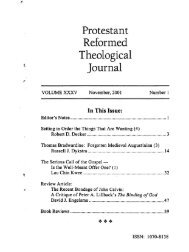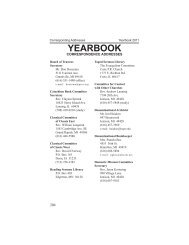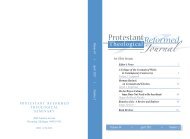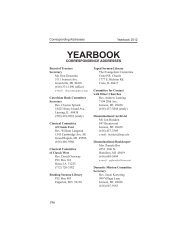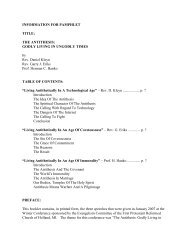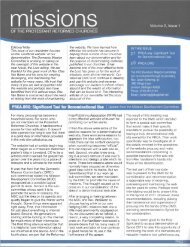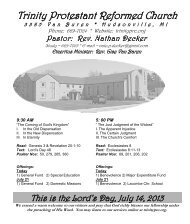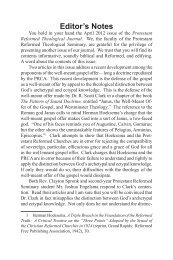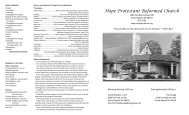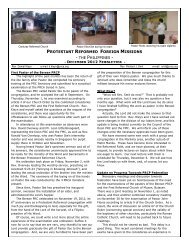November 2007 - Protestant Reformed Churches in America
November 2007 - Protestant Reformed Churches in America
November 2007 - Protestant Reformed Churches in America
Create successful ePaper yourself
Turn your PDF publications into a flip-book with our unique Google optimized e-Paper software.
<strong>Protestant</strong> <strong>Reformed</strong> Theological Journal<br />
Vision camps. From the Scriptures<br />
man always <strong>in</strong>volved “two con-<br />
VanDrunen shows the trast<strong>in</strong>g but compatible pr<strong>in</strong>-<br />
need for Christ’s active obedience<br />
ciples of <strong>in</strong>heritance—namely,<br />
on our behalf; and he ar-<br />
personal merit (i.e., merit<br />
gues that the term “the righteousness<br />
grounded <strong>in</strong> the heir’s own<br />
of God,” as used by works) and representative merit<br />
Paul, refers to this active obedience<br />
(i.e., merit grounded <strong>in</strong><br />
of Christ.<br />
another’s works),” and that<br />
Three essays deal more particularly<br />
“these pr<strong>in</strong>ciples of <strong>in</strong>heritance<br />
with the doctr<strong>in</strong>e of the have existed side-by-side<br />
covenant, as it underlies the through all of history (pre-fall<br />
doctr<strong>in</strong>e of justification by faith and post-fall) until Christ, with<br />
alone.<br />
the former always subserv<strong>in</strong>g<br />
In chapter 5, T. David Gordon<br />
the latter” (pp. 148ff.).<br />
argues that the Auburn Av-<br />
The next chapter conta<strong>in</strong>s<br />
enue theology’s covenant view John Bolt’s response to three<br />
is a necessary consequence of men who <strong>in</strong> their writ<strong>in</strong>gs have<br />
John Murray’s view that God opposed the traditional notion of<br />
has but one covenant (Murray the covenant of works: John<br />
“rejected the traditional dist<strong>in</strong>ction<br />
Stek, Anthony Hoekema, and<br />
between covenant of works Herman Hoeksema. Stek and<br />
and covenant of grace, wish<strong>in</strong>g Hoekema did not want to speak<br />
to construe all covenantal relations<br />
of God’s relationship with Adam<br />
as gracious. He also re-<br />
as a covenant relationship, while<br />
def<strong>in</strong>ed covenant as a relationship,<br />
Hoeksema believed this relation-<br />
not a contract or treaty,” ship to be covenantal, but argued<br />
p. 119).<br />
that this relationship was not a<br />
R. Fowler White and E. legal pact, did not allow Adam<br />
Calv<strong>in</strong> Beisner argue <strong>in</strong> chapter to merit with God, and could not<br />
7 that opponents of justification have resulted <strong>in</strong> Adam obta<strong>in</strong><strong>in</strong>g<br />
by faith alone do not openly a higher level of glory if he<br />
deny the doctr<strong>in</strong>e, but profess to obeyed. Bolt argues that we<br />
believe it, while redef<strong>in</strong><strong>in</strong>g its must emphasize both the legal<br />
terms. They do the same regard<strong>in</strong>g<br />
character and the relational charenant.<br />
the doctr<strong>in</strong>e of God’s covacter<br />
of the doctr<strong>in</strong>e of works.<br />
Not<strong>in</strong>g this, White and He claims that those who deny<br />
Beisner endeavor to show that that God and Adam had a covenant<br />
God’s covenant deal<strong>in</strong>gs with<br />
relationship are wrong,<br />
106<br />
Vol. 41, No. 1



